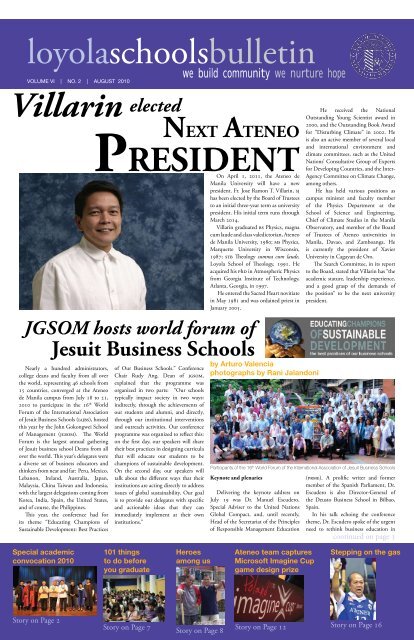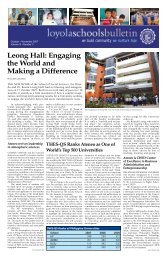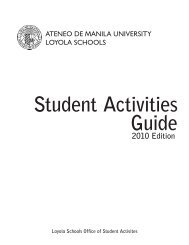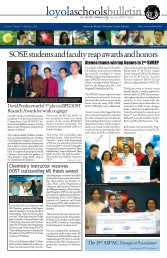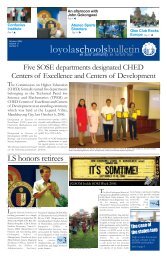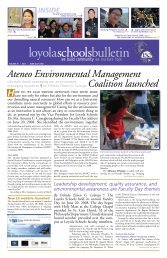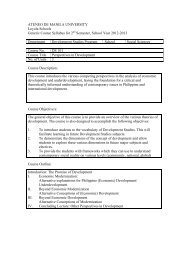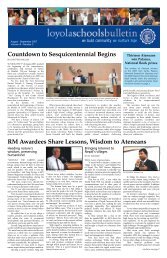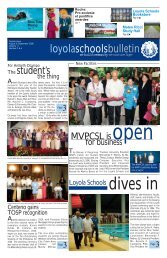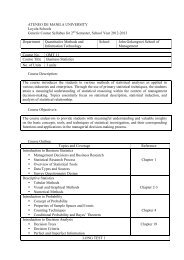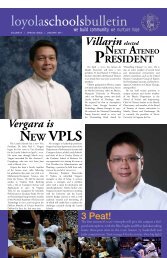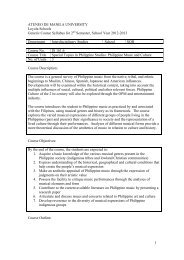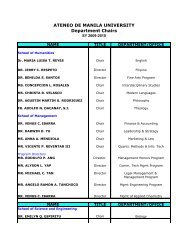Loyola Schools Bulletin - Ateneo de Manila University
Loyola Schools Bulletin - Ateneo de Manila University
Loyola Schools Bulletin - Ateneo de Manila University
Create successful ePaper yourself
Turn your PDF publications into a flip-book with our unique Google optimized e-Paper software.
loyolaschoolsbulletinwe build community we nurture hopeVOLUME VI | NO. 2 | AUGUST 2010VillarinelectedNe x t At e n e oPre s i d e n tOn April 1, 2011, the <strong>Ateneo</strong> <strong>de</strong><strong>Manila</strong> <strong>University</strong> will have a newpresi<strong>de</strong>nt. Fr. Jose Ramon T. Villarin, sjhas been elected by the Board of Trusteesto an initial three-year term as universitypresi<strong>de</strong>nt. His initial term runs throughMarch 2014.Villarin graduated bs Physics, magnacum lau<strong>de</strong> and class valedictorian, <strong>Ateneo</strong><strong>de</strong> <strong>Manila</strong> <strong>University</strong>, 1980; ms Physics,Marquette <strong>University</strong> in Wisconsin,1987; stb Theology summa cum lau<strong>de</strong>,<strong>Loyola</strong> School of Theology, 1991. Heacquired his phd in Atmospheric Physicsfrom Georgia Institute of Technology,Atlanta, Georgia, in 1997.He entered the Sacred Heart novitiatein May 1981 and was ordained priest inJanuary 2005.He received the NationalOutstanding Young Scientist award in2000, and the Outstanding Book Awardfor “Disturbing Climate” in 2002. Heis also an active member of several localand international environment andclimate committees, such as the UnitedNations’ Consultative Group of Expertsfor Developing Countries, and the Inter-Agency Committee on Climate Change,among others.He has held various positions ascampus minister and faculty memberof the Physics Department at theSchool of Science and Engineering,Chief of Climate Studies in the <strong>Manila</strong>Observatory, and member of the Boardof Trustees of <strong>Ateneo</strong> universities in<strong>Manila</strong>, Davao, and Zamboanga. Heis currently the presi<strong>de</strong>nt of Xavier<strong>University</strong> in Cagayan <strong>de</strong> Oro.The Search Committee, in its reportto the Board, stated that Villarin has “theaca<strong>de</strong>mic stature, lea<strong>de</strong>rship experience,and a good grasp of the <strong>de</strong>mands ofthe position” to be the next universitypresi<strong>de</strong>nt.JGSOM hosts world forum ofJesuit Business <strong>Schools</strong>Nearly a hundred administrators,college <strong>de</strong>ans and faculty from all overthe world, representing 46 schools from15 countries, converged at the <strong>Ateneo</strong><strong>de</strong> <strong>Manila</strong> campus from July 18 to 21,2010 to participate in the 16 th WorldForum of the International Associationof Jesuit Business <strong>Schools</strong> (iajbs), hostedthis year by the John Gokongwei Schoolof Management (jgsom). The WorldForum is the largest annual gatheringof Jesuit business school Deans from allover the world. This year’s <strong>de</strong>legates werea diverse set of business educators andthinkers from near and far: Peru, Mexico,Lebanon, Ireland, Australia, Japan,Malaysia, China Taiwan and Indonesia,with the largest <strong>de</strong>legations coming fromKorea, India, Spain, the United States,and of course, the Philippines.This year, the conference had forits theme “Educating Champions ofSustainable Development: Best Practicesof Our Business <strong>Schools</strong>.” ConferenceChair Rudy Ang, Dean of jgsom,explained that the programme wasorganized in two parts: “Our schoolstypically impact society in two ways:indirectly, through the achievements ofour stu<strong>de</strong>nts and alumni, and directly,through our institutional interventionsand outreach activities. Our conferenceprogramme was organized to reflect this:on the first day, our speakers will sharetheir best practices in <strong>de</strong>signing curriculathat will educate our stu<strong>de</strong>nts to bechampions of sustainable <strong>de</strong>velopment.On the second day, our speakers willtalk about the different ways that theirinstitutions are acting directly to addressissues of global sustainability. Our goalis to provi<strong>de</strong> our <strong>de</strong>legates with specificand actionable i<strong>de</strong>as that they canimmediately implement at their owninstitutions.”by Arturo Valenciaphotographs by Rani JalandoniParticipants of the 16 th World Forum of the International Association of Jesuit Business <strong>Schools</strong>Keynote and plenariesDelivering the keynote address onJuly 19 was Dr. Manuel Escu<strong>de</strong>ro,Special Adviser to the United NationsGlobal Compact, and, until recently,Head of the Secretariat of the Principlesof Responsible Management Education(prme). A prolific writer and formermember of the Spanish Parliament, Dr.Escu<strong>de</strong>ro is also Director-General ofthe Deusto Business School in Bilbao,Spain.In his talk echoing the conferencetheme, Dr. Escu<strong>de</strong>ro spoke of the urgentneed to rethink business education incontinued on page 3Special aca<strong>de</strong>micconvocation 2010101 thingsto do beforeyou graduateHeroesamong us<strong>Ateneo</strong> team capturesMicrosoft Imagine Cupgame <strong>de</strong>sign prizeStepping on the gasStory on Page 2Story on Page 7Story on Page 8Story on Page 12Story on Page 16
2NewsFour exemplary individuals werefeted and recognized by the<strong>Ateneo</strong> <strong>de</strong> <strong>Manila</strong> <strong>University</strong>at a Special Aca<strong>de</strong>mic Convocation heldon July 22, 2010 at the Henry Lee IrwinTheater. The awar<strong>de</strong>es were Fe<strong>de</strong>ricoAguilar Alcuaz, Fr. Sebastiano D’Ambra,Monsignor Jose “Chito” C. Bernardo, Jr.,and Dr. Jose Alfredo “Alran” Bengzon.Alcuaz, an esteemed National Artistwhose life’s work pursued Filipinismand Filipino i<strong>de</strong>ntity through culturalen<strong>de</strong>avors received the Gawad Tanglaw ngLahi Award). D’Ambra of the PontificalInstitute for Foreign Missions (pime) andBernardo of the Assist Ministry and cbcpGalilee Center both received the BukasPalad Award in memory of Fr. ManuelPeypoch, sj which captures the Ignatianspirit of generosity and gives recognitionto the unconditional, <strong>de</strong>dicated serviceof religious in Christ’s kingdom.Bengzon, the <strong>Ateneo</strong>’s Vice Presi<strong>de</strong>ntfor the Professional <strong>Schools</strong> and SocialDevelopment, was granted the Lux-in-Domino Award, a capstone award foroutstanding life and work achievementembodying the noblest i<strong>de</strong>als of the<strong>Ateneo</strong> <strong>de</strong> <strong>Manila</strong> <strong>University</strong>.Conferment of the traditional<strong>University</strong> awards was led by <strong>University</strong>Presi<strong>de</strong>nt Fr. Bienvenido F. Nebres, sjin the company of the <strong>University</strong>’s topadministrators Dr. John Paul Vergara,Vice Presi<strong>de</strong>nt for <strong>Loyola</strong> <strong>Schools</strong>;Dr. Edna Franco, Vice Presi<strong>de</strong>nt forAdministration and Planning; Mr. JoseF. Santos, Vice Presi<strong>de</strong>nt for Financeand Treasurer; with Fr. Roberto Yap, sjTreasurer of the Philippine Province ofthe Society of Jesus and Dr. Patricia B.Licuanan, Chair of the Commissionon Higher Education. Mr. RomeoDalandan, Director of the Office ofAlumni Affairs was master of ceremoniesfor the convocation. A special featuremarking this year’s convocation were thefinely ma<strong>de</strong> audiovisual presentationson each of the awar<strong>de</strong>es. Close friendsand colleagues along with the <strong>University</strong>community were invited to celebratethe special occasion which was cappedwith refreshments and dinner with theawar<strong>de</strong>es.The Special Aca<strong>de</strong>mic Convocation isa time-honored tradition of the <strong>Ateneo</strong>,a special time that is set asi<strong>de</strong> duringthe year to recognize and give tributeto individuals or groups both fromwithin and outsi<strong>de</strong> the <strong>University</strong> whohave ma<strong>de</strong> outstanding contributionsto Philippine society in particular andthe wi<strong>de</strong>r world outsi<strong>de</strong> the country ingeneral. The traditional awards givenduring this festive occasion inclu<strong>de</strong> thefollowing: Bukas Palad Award, GawadTanglaw ng Lahi, Lux-In-DominoAward, Ozanam, Government ServiceAward, Parangal Lingkod Sambayanan,and Honorary Degrees.The Honors and Awards Committee ofthe Board of Trustees invites nominationsfrom the <strong>University</strong> community for theseawards at the start of the year, and fromthis pool of nominees, the Committeemakes a final selection. Not all of theabove-mentioned awards are actuallygiven every year and would <strong>de</strong>pend uponloyolaschoolsbulletinwe build community we nurture hopeSpecial aca<strong>de</strong>mic convocation 2010by Erlinda Eileen G. Lolargawhether the Committee was able to selecta qualified person/s (even posthumous)or group/organization for each awardcategory from among those nominated.Excerpts from the respectivecitations of the awar<strong>de</strong>es sum up theirlife achievements that have been dulyrecognized by the <strong>Ateneo</strong> <strong>de</strong> <strong>Manila</strong><strong>University</strong>:Fe<strong>de</strong>rico Aguilar Alcuaz(Gawad Tanglaw Lahi)“…Recognizes not only his role inPhilippine art but an expansion of howwe can imagine the Philippine i<strong>de</strong>ntity,that we confirm his stature and aspirethat it may find a meaningful placeamongst the artist’s many accola<strong>de</strong>s…”Fr. Sebastiano D’Ambra, p i m e (BukasPalad)“For offering of himself generously tobe the bridge of un<strong>de</strong>rstanding, peaceand cooperation between Christians,Muslims and Lumads by establishingthe Silsilah Dialogue Movement thatpromotes the culture of dialogue “insolidarity with all people, regardless ofculture and faith”;For helping plant the seeds ofinterreligious dialogue in the Philippines,particularly in Mindanao, and nurturingand spreading them through hislea<strong>de</strong>rship roles in the interreligiousdialogue thrusts of the PontificalInstitute for Foreign Missions (pime)and the Catholic Bishops Conference ofthe Philippines (cbcp)….”Monsignor Jose “Chito” Bernardo(Bukas Palad Awar<strong>de</strong>e)“…The holy Curé of Ars spoke of theCatholic priesthood as the embodimentof “the love of the heart of Jesus” in theChurch and in the world. Because hehas generously and <strong>de</strong>votedly given mostof his priestly life and work (nearly 35years, 17 of them as Executive Secretaryto the cbcp Clergy Commission) toserve priests and their priestly ministry;because he has so assiduously <strong>de</strong>velopedand fostered the ministry of “supportingand caring for the shepherds of theLord’s flock”, their initial and ongoingformation, their constant and faithfullife-renewal, and – when called for –their integral healing; because <strong>de</strong>spitethe bur<strong>de</strong>n of serious health-difficulties,he has persevered in this much-nee<strong>de</strong>dand pioneering en<strong>de</strong>avor, <strong>de</strong>velopingand “Assist Ministry” and raising up thenational “Galilee Center” as its home;because he has thus lived out in life thepriesthood’s faithful “embodiment ofthe love of the Heart of Jesus” in ourmidst….”Dr. Alfredo R. A. Bengzon (Lux-in-Domino Awar<strong>de</strong>e)“In recognition of a man who has<strong>de</strong>eply, profoundly, and outstandinglyreflected Ignatian spirituality and thenoblest i<strong>de</strong>als of the <strong>Ateneo</strong> <strong>de</strong> <strong>Manila</strong>throughout his life; in appreciation ofhis constant openness to God’s call toservice, generosity, and greatness; andin recognition of the legacy that heleaves behind in the worlds of health,governance, and higher education….”Photo by Melencio GallardoVice Presi<strong>de</strong>nt for the <strong>Loyola</strong> <strong>Schools</strong> Dr. John Paul Vergara, Treasurer of the Philippine Province of the Society of Jesus, Treasurer of thePhilippine Province of the Society of Jesus Fr. Roberto Yap, SJ, ADMU Presi<strong>de</strong>nt Fr. Bienvenido F. Nebres, SJ, Bukas Palad awar<strong>de</strong>e Fr.Sebastiano D’Ambra, PIME, Lux-in-Domino awar<strong>de</strong>e Dr. Alfredo R.A. Bengzon, Bukas Palad awar<strong>de</strong>e Monsignor Jose “Chito” Bernardo, CHEDCommissioner Dr. Patricia B. Licuanan, Vice Presi<strong>de</strong>nt for Administration and Planning Dr. Edna Franco, and Vice Presi<strong>de</strong>nt for Finance andTreasurer Mr. Jose F. Santos. Not in photo: Gawad Tanglaw ng Lahi awar<strong>de</strong>e Mr. Fe<strong>de</strong>rico Aguilar Alcuaz.Gawad Tanglaw ng Lahi awar<strong>de</strong>eFe<strong>de</strong>rico Aguilar AlcuazBukas Palad awar<strong>de</strong>eFr. Sebastiano D’Ambra, PIMEBukas Palad awar<strong>de</strong>eMonsignor Jose BernardoLux-in-Domino awar<strong>de</strong>eDr. Alfredo R.A. Bengzon
VOLUME VI | NO. 2 | AUGUST 2010JGSOM hosts world forumcontinued from page 1the light of globalization, technology,governance gaps and the crucial role ofbusiness in society. He urged businessschools to focus on global sustainability,the single most important issueconfronting society today, especiallyin the long-term context of worldwi<strong>de</strong>financial instability and resourcebottlenecks. He looked forward to a newgeneration of Deans who will championresponsible management education,and pointed out that Jesuit businessschools have a lea<strong>de</strong>rship role to playin this field, as our unique educationaltradition and shared vision and missionhave had us working on the issues ofsocial <strong>de</strong>velopment long before the i<strong>de</strong>aof sustainable <strong>de</strong>velopment had becomefashionable worldwi<strong>de</strong>.Three plenary presentations addressedvarious aspects of the conference theme:<strong>University</strong>, Barcelona, Spain• Dr. Michael Lee, Dean, Collegeof Management, Fu-Jen Catholic<strong>University</strong>, Taipei• Dr. Michael Duffy, Dean, Schoolof Business and Professionalstudies, <strong>University</strong> of SanFrancisco, California• Prof. Parissa Haghirian, AssociateProfessor, Sophia <strong>University</strong>,Tokyo, Japan• Dr. James Koch, Director, GlobalSocial Benefit Incubator, Centerfor Science, Technology andSociety, Santa Clara <strong>University</strong>,California• Fr. Sanjay Kujur, sj, Faculty,Xavier Institute, Jabalpur, India• Fr. Roberto M. Ribeiro, sj,Director, The Beijing Center,<strong>University</strong> of InternationalBusiness and Economics, Beijing,China13• Fr, Bienvenido Nebres, sj,Presi<strong>de</strong>nt of the <strong>Ateneo</strong> <strong>de</strong><strong>Manila</strong> <strong>University</strong>, talked abouthis university’s response to thecall for social responsibility ofJesuit business schools.• Fr. Fernando <strong>de</strong> la Iglesia Viguiristi,sj, Vice-Rector of Universidad <strong>de</strong>Deusto in Barcelona, establishedthe link between the mission ofCatholic universities to searchfor truth and the critical taskof <strong>de</strong>veloping a values-basedbusiness curriculum.• Mr. Tony Meloto, ExecutiveDirector of Gawad Kalinga(gk), shared his views on therole that the private sector mustplay in promoting sustainable<strong>de</strong>velopment, using his personaljourney and the gk story as amo<strong>de</strong>l.PanelsComplementing the plenarypresentations were five separate panelsof speakers that addressed a broadrange of issues, including best practicesin <strong>de</strong>veloping a values-based businesscurriculum, and university-basedinitiatives to address the twin issues ofenvironmental protection and povertyalleviation. The distinguished panelistsinclu<strong>de</strong>d:• Dr. Karyl Leggio, Dean,Sellinger School of Business andManagement, <strong>Loyola</strong> <strong>University</strong>,Baltimore, Maryland• Dr. Eugenia Bieto, Director-General of esa<strong>de</strong>, Ramon LlullDefining the practice of aca<strong>de</strong>mic integrityThe <strong>Loyola</strong> <strong>Schools</strong> has releasedtwo booklets on the topic of aca<strong>de</strong>micintegrity. The stu<strong>de</strong>nt and faculty gui<strong>de</strong>sto the Co<strong>de</strong> of Aca<strong>de</strong>mic Integrity weredistributed to stu<strong>de</strong>nts and <strong>de</strong>partmentsat the beginning of the school year.The booklets were the products of thework of an ad hoc committee formed in2009 by then vpls Dr. Ma. Assunta C.Cuyegkeng. The committee’s mandatewas to probe the important issue ofaca<strong>de</strong>mic dishonesty and proposeParallel EventsApart from the usual sightseeingand cultural programs organized inconjunction with the conference, thisyear’s Forum inclu<strong>de</strong>d two parallelevents organized for the first time at aniajbs event: a Jesuit Alumni NetworkingCocktail, and an aacsb accreditationworkshop.The Networking Cocktail, held at the<strong>Ateneo</strong> Art Gallery, brought togetherPhilippine-based alumni of overseas Jesuitbusiness schools to witness the launchof the Global Jesuit Business AlumniAssociation, and to meet the Deans andfaculty of their overseas alma maters.Special guests at the event inclu<strong>de</strong>d u.s.Ambassador Harry Thomas, himself theproduct of a Jesuit education (College ofthe Holy Cross), and Mr. Sudip Mall,Presi<strong>de</strong>nt of Kraft Foods Philippines,who completed his mba at the XavierLabor Relations Institute in Jamshedpur,India.The aacsb accreditation workshop,chaired by Dean James Daley of Rockhurst<strong>University</strong> (Kansas City, Missouri),discussed the benefits of accreditation,and walked the participants through theapplication process. Dr. Eileen Peacock,Vice Presi<strong>de</strong>nt for Asia of aacsb, was amember of the panel.Congratulations to the JohnGokongwei School of Managementfor its highly successful staging of theconference. Dr. David Mayorga, Deanof the School of Business and Accountingat the Universidad <strong>de</strong>l Pacifico will havea tough act to follow when he hosts the17 th World Forum of the iajbs next yearin Lima, Peru!action to be taken. The committeeen<strong>de</strong>avored to examine the existentknowledge and common practicesregarding the subject. Notably, a surveywas conducted among all <strong>Loyola</strong> <strong>Schools</strong><strong>de</strong>partments and faculty regarding theirexperiences with aca<strong>de</strong>mic dishonesty,and the measures taken in their classesto promote and safeguard aca<strong>de</strong>micintegrity. Experiences of the DisciplineCommittee were also culled for insightsinto stu<strong>de</strong>nt and faculty behavior. The1. Keynote: “The U.N. Global Compact:Principles for Responsible managementEducation” by Dr. Manuel Escu<strong>de</strong>ro,Special Adviser to the UN Global Compact;Head, PRME Secretariat, Director General,DEUSTO Business School, Universidad <strong>de</strong>Desuto (Bilbao, Spain).2. Fr. Ben Nebres and special guest USAmbassador Henry Thomas,alumnus of the College of the Holy Cross, aJesuit liberal artscollege in Massachusetts3. Dr. Michael Lee, Dean, College ofManagement, Fu Jen Catholic <strong>University</strong>(Taipei, Taiwan), IAJBS Presi<strong>de</strong>nt center Dr.Gregory Ulferts, IAJBS Executive DirectorDean Rodolfo P. Ang, John GokongweiSchool of Management, <strong>Ateneo</strong> <strong>de</strong> <strong>Manila</strong><strong>University</strong>4. In his keynote speech, Kraft FoodsPhilippines, Inc. presi<strong>de</strong>nt and generalManager Sudip Mall talked about hIs hisJesuit education has influenced the way hehas lived his personal and professional life.Mall is an MBA graduate of Xavier LaborRelations Institute in Jamshedpur, India,which hosted the IAJBS Forum last year. Mallhas lived in the Philippines since 2007.result of this research formed the basisfor the gui<strong>de</strong>s, which elaborate on theestablished policies in the Co<strong>de</strong> ofDiscipline, seeking to articulate baselineexpectations and establish a level ofun<strong>de</strong>rstanding among the members ofthe <strong>Loyola</strong> <strong>Schools</strong>.The Stu<strong>de</strong>nt Gui<strong>de</strong> to the Co<strong>de</strong> ofAca<strong>de</strong>mic Integrity may be viewed onlineat http://ls.ateneo.edu/global/UserFiles/File/The_LS_Co<strong>de</strong>_of_Aca<strong>de</strong>mic_Integrity_Stu<strong>de</strong>nt_Gui<strong>de</strong>.pdf.2 34 565. PANEL: A Systematic Approach to <strong>University</strong>Intervention in Sustainable Development: The<strong>Ateneo</strong>-GK Partnership1.2.3.Mr. Mark Lawrence B. Cruz, Coordinator,GK-<strong>Ateneo</strong> Coordinating OfficeMr. Frank Lester U. Chiu, <strong>Ateneo</strong> GKProgram Officer for Social EnterpriseDevelopmentMr. Rico Ma. Antonio L. Gonzalez,Director, <strong>Ateneo</strong> Center for SocialEntrepreneurship (ACSEnt)6. Dr. Perry Devanesan, Head, Departmentof Social Dynamics, St. Joseph’s College(Tiruchirapalli, Tamil Nadu, India)“...every member of the <strong>Loyola</strong><strong>Schools</strong> community is tasked tobecome not just intellectuallyexcellent, but morally virtuousas well. This is accomplishedby honing sapientia an<strong>de</strong>loquentia—thinking andcommunicating one’sthoughts—always in the spiritof honesty.” —from Section 1:The Core Principles
6 loyolaschoolsbulletin we build community we nurture hopeFeaturesMaking savings a habit with the<strong>Loyola</strong> <strong>Schools</strong>by Erlinda Eileen G. Lolargaphotos by Nico ManiquisCredit Cooperative1 231. Board member Jerry Respeto speaks during the GA, 2. Ready to receive participants at the last LSCC general assembly,3. Many LS community members have caught the saving bug as evi<strong>de</strong>nced by the rush at the last LSCC general assemblyWe can make savings a habit if wevalue our future security and comfort.Has it ever occurred to us to reflect on:How much of one’s net monthly salaryas an employee goes towards a regularand consistent savings plan? Can wereally save 5% or even up to 20% ofwhat we earn so that we can meet futurefinancial obligations and unforeseenuncertainties in life with ease? Where canwe take our hard-earned savings duringthese difficult economic times so that itwill grow and work for us in the futurewhen our earning capacities diminishwith old age and <strong>de</strong>teriorating health?What is the road to financial freedomgiven a stable job and a regular income,no matter how small the earnings atthe start? Oftentimes, it seems, beingable to save a portion of one’s salary ismore of a fortuitous acci<strong>de</strong>nt or a rollercoaster ri<strong>de</strong>—spending more and savingless in a haphazard way, rather than in aregular, planned and systematic manner.Do some of us make a conscious and<strong>de</strong>liberate act to save so that eventually,this saving behavior pays off in terms ofa more secure and comfortable future forourselves and our families? In what wayscould we enhance our economic wellbeing?Where could we find these safetynets?The <strong>Loyola</strong> <strong>Schools</strong> CreditCooperative or lscc as it is commonlycalled is one of the facilities within the<strong>University</strong> which was established tohelp full-time <strong>Ateneo</strong> employees at the<strong>Loyola</strong> <strong>Schools</strong> meet the need for growthof their savings and to have access toloans for such things as emergenciesor for supplementing personal/familyexpenses. It is a primary cooperativeformally established in 1992 un<strong>de</strong>rPhilippine Cooperative Law namelyr.a. 6938, some original “cooperators”inclu<strong>de</strong>d Dean Rodolfo Ang and Dr.Darwin Yu of the John GokongweiSchool of Management (jgsom), whom,according to lscc General ManagerDr. Venus Ibarra (also of jgsom), wereactually the ones who spearhea<strong>de</strong>d andorganized the credit cooperative with itsmain purposes of encouraging savingsfirst and then extending credit also.According to Ibarra, the lscc wasestablished by employees to help oneanother. She elaborates that here, thesavings of others could be useful to otherswho are in need of loans. From an initialmembership of about 260 ls personnel,the voluntary organization has grown toabout 300 plus members from the ranksof ls administrators, faculty and staff,and 51 members from ls maintenanceas of April 2010.The main source of lscc’s revenue,she reveals, are interests from loans andservice fees. To date, she reported thatthe coop’s share capital has grown toPhp 8 million (just below the mandatedPhp 10 Million). The coop earnings (theinterests and service charges) at the end ofthe year are distributed to the members asinterest to their capital share, interest totheir savings and cash divi<strong>de</strong>nds, calledrebates. A certain percent of the earningsis <strong>de</strong>ducted for mutual funds (less than5% as mandated by law); 2.5% fortraining (education about cooperatives)and 2.5% for apex.Share capital of members can only betaken out when the member resigns fromthe coop. Thus, those who resign orleave <strong>Loyola</strong> <strong>Schools</strong> to move to another<strong>University</strong> unit are automatically <strong>de</strong>emedresigned from the coop and should takeout their share capital. As mandated byPhilippine law, earnings of cooperativesare not taxed if the earnings stay withincertain limits set by the government.Other voluntary organizations establishedin the <strong>University</strong> to benefit employeesinclu<strong>de</strong> the <strong>Ateneo</strong> Employees MultipurposeCooperative (aemc) and theCentral Administration Credit Union(cacu). Other <strong>University</strong> units mayhave established their own cooperativesas well.There is still room for growth formembership in the lscc since not all ofthe current <strong>Loyola</strong> <strong>Schools</strong> employeeshave applied for membership. Similar tothe aemc arrangements, once you applyfor membership as an ls employee,automatic salary <strong>de</strong>duction can beavailed of to build one’s share capital andsavings in the cooperative. To encouragesaving behavior, she cited an example inwhich she observed that with religioussaving, one retired member was able tosave as much as one million pesos. Thistime, however, the lscc Board placeda Php 500,000 cap to the amount thatmembers can keep with the cooperativeso that earnings will be distributed tomajority of the members and not just toa few members with the biggest savings.A minimum amount of subscriptionto enable a member to make a loan isPhp 5,000 (equal to five shares). Amembership fee of Php100 is charged forthose who apply for membership. Ibarraopines that it seems that more membersare motivated more by the anticipationof getting loans so that they save tobecome members, rather than seeing thefacility as an opportunity to build and/orsupplement their savings nest-egg for thefuture. Some member, she feels “over-use the credit facility of the cooperativeand may be living beyond their means.”She <strong>de</strong>clared that only a few are reallysavers. In truth, she dreads the i<strong>de</strong>a thatthe lscc has now become more of alending institution rather than a savingsinstitution.Ibarra, who is a faculty member ofthe jgsom’s Finance and AccountingDepartment, has been the lscc generalmanager for several years now andhas earned the trust and respect ofher co-members for her competentmanagement of their funds. She overseesthe daily operations of the organizationwith the help of one hired regular staff,Ms. Rebecca Monis, who handles mostof the organization’s clerical tasks.Other lscc members from the ranksof ls administrators, faculty, staff andmaintenance are elected to two-yearterms as Board members tasked withreviewing and updating policy mattersof the organization and other relevantassignments. Board members for sy2010-2011 are the following: PaulaAgnes Angeles (staff), Jesus Manuel(maintenance), Luisa Mol<strong>de</strong>ra (staff),Julia Cristina Morata (administrator),Lour<strong>de</strong>s David (administrator), AmadorR. Grutas (staff), Jerry Respeto (facultymember).It’s time to catch up on our savings.What better facility to do this on-campusthan the lscc.Ibarra’s challenge to the <strong>Loyola</strong><strong>Schools</strong> community one and all: “Dapatsavings ang objective ng members!” Let’sall start our own savings plan today.
VOLUME VI | NO. 2 | AUGUST 2010101things to dobefore you graduate7Watch all the games of the Blue Eaglesthis UAAP season. Climb the Churchof the Gesu. Have my pic taken withFr. Ben. Complete this year’s SimbangGabi at the Gesu. Go on a trip with thebarkada before we all graduate. Join animmersion.“Marami pa ako ilalagay sa list perobaka hindi na ako makapasok sa klase atma-overcut pa ako,” says Gico Sinjian,<strong>Ateneo</strong> cheerlea<strong>de</strong>r and one of thecurrent campus comedians. “It’s my lastyear and I have to make the most of it.”The years that comprise one’s collegeyears can be said to be a voyage ofdiscovery. It’s a time of unforgettable“firsts:” first day of school withblockmates, first date, first Philo oralexams, first organization, first gig witha band, first <strong>Ateneo</strong>-La Salle game, firstvisit to the area. And there’s more. Morethan the simple, everyday, and mundanethings. The <strong>Ateneo</strong> education isn’t justfour (or five) years of major subjects,plus English, Math, Philosophy, andTheology, among others. There’s a masterplan in producing graduates who willlive for the world and the community atlarge.by Rick Olivaresphotos by Ivan Jacob A. PesiganDr. John Paul C. Vergara, Vice Presi<strong>de</strong>nt for the <strong>Loyola</strong><strong>Schools</strong>, says, “Senior year is the culmination of a longjourney. It involves many things from the aca<strong>de</strong>mic to thenon-aca<strong>de</strong>mic. There will be thesis topics to be consi<strong>de</strong>red,proposals to be <strong>de</strong>fen<strong>de</strong>d, organization work to be seen to,events to be atten<strong>de</strong>d, and resumes to be written. In somesense, senior year is a year of <strong>de</strong>tails. It is also a year of synthesisand integration. There will be many things that you will needto see to in trying to wrap up one’s college life.”To help seniors along, there’s Paglunsad, the SeniorIntegration Program (sip) where stu<strong>de</strong>nts take part inimmersion programs, un<strong>de</strong>rgo retreats, and sign up for jobfairs. At the start of the schoolyear, stu<strong>de</strong>nts from the fourschools separately atten<strong>de</strong>d a short assembly where the SIPwas explained in greater <strong>de</strong>tail. The stu<strong>de</strong>nts were also treatedto several vi<strong>de</strong>os done by graduates that summed up theircollege life and the Paglunsad program in a ten-minute film.Ariel Diccion, a faculty member with the FilipinoDepartment and host of the Paglunsad events, enthuses that“Seniors are taught to come up with a ‘Bucket List’ of all thethings they want to accomplish in their final year. It can rangefrom the kalokohan—and let’s not give them i<strong>de</strong>as here—tothe more meaningful ones. It’s a list that should be doable andmeaningful as they wrap up their college lives.”Sinjian concurs with Diccion, “I think it’s a good programthat puts things in perspective. Kung baga, it adds greatermeaning to what we’ve been doing all along. But for me, I cangraduate in peace when I get a girlfriend this year.”A writing activity duringa Paglunsad launchby Joanna RuizPhotos by Kevin C. Tatco11. Graffiti Wall, 2. Architect Mico Manalo talking to participants on-site, 3. Dr. Butch Zialcita withsome participantsThe <strong>Ateneo</strong> Cultural Laboratory (acl)was envisioned as a hands-on way to teachand <strong>de</strong>monstrate the connection betweenresearch and application, particularlyin the field of Philippine culture. For2010, the actual laboratory was to be asite which has been at the forefront ofPhilippine history: the walled city ofIntramuros. This was particularly timelysince there are plans to put up a Museo<strong>de</strong> Intramuros on the site of the Jesuitchurch of San Ignacio.Designed as a three-week intensiveprogram, the acl’s aim was to give theparticipants knowledge and skills incultural documentation. The objectiveof the program was to come up withcultural maps of Intramuros per centuryto reveal the role of Intramuros in nationbuilding.This, in turn, would form thenarrative for the Museo <strong>de</strong> Intramuros.The acl was held from April 12 toMay 5, 2010 un<strong>de</strong>r the auspices ofthe <strong>Ateneo</strong> <strong>de</strong> <strong>Manila</strong>’s Department ofSociology and Anthropology representedby Dr. Fernando N. Zialcita, theDepartment of History represented byDr. Olivia Anne M. Habana , and theFine Arts Program, represented by Fr.Rene Javellana, s.j. The IntramurosAdministration (ia) and the NationalCommission for Culture and the Arts(ncca) also helped by providing accessand research resources.The course began with one week oflectures on topics ranging from researchmethods in cultural anthropology andhistory, issues in heritage preservation,and the history of Intramuros. Lectureswere given by the proponents of thecourse as well as other expert resourcepersons such as Dr. Rico T. Jose, Dr.Michael Canilao, and Dr. Anna Labrador.The participants were composed ofun<strong>de</strong>rgraduate and graduate stu<strong>de</strong>ntsof <strong>Ateneo</strong>, as well as participants fromother institutions such as Colegio <strong>de</strong> SanJuan <strong>de</strong> Letran, Cavite Studies Centerand Holy Angels <strong>University</strong>. There werealso participants from other countriessuch as China, Nigeria, and Japan.The next two weeks entailed sitevisits, tours, and hands-on researchconducted in Intramuros itself. Theseswere supplemented by on-site lectures—Dr. Celestina Boncan’s “A Market inIntramuros: Basco’s Impossible Dream”,Dr. Macario Ofilada’s “The Beginningof Liberal Education in the Philippines”and Romeo Galang’s “The CultureBearers of Historic <strong>Manila</strong>”. In teams,the participants documented culturalheritage, interviewed informal settlersand resi<strong>de</strong>nts, and researched on sitesand structures.As a culminating activity, theparticipants presented their findingsto the ncca and IntramurosAdministration. Ms. Bambi Harper,head of the ia, commen<strong>de</strong>d the rigorof the research and was impressed withthe output. She was hopeful that thesuggestions could be carried out andapplied to the Museo <strong>de</strong> Intramuros andin general, raise awareness of heritagedocumentation in Intramuros. All inall, the experience was <strong>de</strong>scribed bystu<strong>de</strong>nts as fruitful and revealing as itgave them a new-found respect for theprocess of cultural documentation andresearch. The course is also a concretemanifestation of the possibilities andsynergistic results of multidisciplinaryand inter<strong>de</strong>partmental cooperationin the <strong>Loyola</strong> <strong>Schools</strong>. Watch out forIntramuros Cultural Laboratory Part iiin the Summer of 2011!2 3The <strong>Ateneo</strong>Cultural Laboratory inIntramuros
8loyolaschoolsbulletinwe build community we nurture hopeFeaturesHeroes among usbyRoy Tristan B. Agustinphotos courtesy of the Officeof Administrative ServicesLS maintenance personnel give their time to GKThis was supposed to be an interview.It was not easy inviting them tothe interview. In the conferenceroom of the Social Sciences building,they are fidgeting in the seats, clearlyuncomfortable sitting in the seats theyhave so often carried and re-arranged.Thirteen people are sitting down, twelvemen and one lady. They are all wearingthe blue shirts and jeans of the <strong>Loyola</strong><strong>Schools</strong> maintenance staff. They are alltanned from years working un<strong>de</strong>r thesun, their arms muscled and their handsrough. These same hands are now lost,some clenched, others rubbing togetherself-consciously. They aren’t used to bethe centers of attention. For nearly allof them, the i<strong>de</strong>a of being interviewed isunheard of. They are being interviewedbecause they are volunteers for GawadKalinga, and have been for quite sometime now.These thirteen people are beinginterviewed because they are heroes.It would be so easy to extol theirheroics, to talk about them as if theywere extraordinary individuals, giftedwith divine grace. But that wouldcheapen them and their efforts. They areordinary folks, but they are folks whohave learned the peculiar joy that comeswith volunteering. And in their stories,one finds a common thread, that of joy.They stare at the recor<strong>de</strong>r set in themiddle of the room like it was about toexplo<strong>de</strong>. Finally, however, the storiesbegin, awkwardly at first. The questionswere never answered by one person,eventually, it would become too difficultto keep track of who would be answeredwhat.It was less of an interview and morejust talking, trading stories. Peoplewould reply individually to somequestions, in chorus to others. In theend, the interview failed, not becauseno one answered, but because there werejust too many stories, too many inputsbeing given. An interview would becumbersome and confusing, and it mayjust sully the story that these people told.Instead of giving a transcript, we will telltheir story.The Gawad Kalinga projects thatthey are being interviewed for are justpart of the story. For some of them,volunteerism is nothing new—they havebeen volunteering in various capacitiesfor some time. Richardo Gabito,for example, was already helping outwhen <strong>Ateneo</strong> began its formal disasterassistance efforts with the shelteringof Mt. Pinatubo refugees in 1992. Hesmiles shyly as he recounts an instancewhen he had to sing to the refugees, justto try to keep their hopes up in light ofeverything they had lost.For others, their experience involunteering, and in Gawad Kalinga,began with Cabiao, Nueva Ecija. Itwas a call ma<strong>de</strong> by their supervisor, JunGranada, to assist in the constructionof a library. It was, for many, a newthing, many not having heard of GawadKalinga before. They were greeted by themembers enthusiastically. Alex Ferrerrelates his experience of being given theonly bedroom in a household of women,given a bed filled with teddy bears evenas they slept on the floor. The story istold with smiles, but this and the group’sother experiences were evi<strong>de</strong>ntly morethan that, as one sees the emotionsclouding their eyes. For many of them,being given a bed as the owners slept onthe floor was humbling.The experience in Cabiao, however,was more than just humbling—it wastraumatic. The volunteers set to work,only to be set on by torrential rain. Therain was enough to cause their cement torun, making placing blocks one on top ofeach other impossible. Cenon Tapel hadhis foot impaled by a metal spike in theconstruction. Even then they struggled,at times simply standing still as theywere battered by the wind and rain. Theresi<strong>de</strong>nts called for them to stop, but theystubbornly refused, concerned that thecement they had already prepared wouldgo to waste. It was only when they werereassured that the cement would not bewasted that they relented, surren<strong>de</strong>ringto the weather. They would realize lateron that, in the confusion of the storm,they had built a house with no doorsand windows, which they nee<strong>de</strong>d torectify once more. The Cabiao projectwas completed in the time allotted,the volunteers refusing sleep just to getthings done.It was to be a start for them, the projectproving to be a baptism of fire. Fromthere, they would go on to other areas inNueva Ecija, Palawan, and Payatas. Theywould build houses and schools, often ina span of a few days. They would go backnot just because they were doing good,but because the good they did ma<strong>de</strong>them feel good. The songs of thanksthat the children of the communitieswould bring even the toughest mento tears. Some of them nee<strong>de</strong>d to slowdown in the telling, their eyes mistingover, obviously remembering songs andvoices of thanks they will never forget.Others remember being locked in anembrace by grateful el<strong>de</strong>rs, overwhelmedwith gratitu<strong>de</strong>. Their efforts wouldbring them into contact not only withvolunteers from around the country, butaround the world.They would have other experiences aswell. When Typhoon Ondoy hit, theyreplied to the call once more, this timeto clean and lend assistance. Here, thepeople they helped were not as gratefuland were, at times, openly hostile tothem. More often than not, it was simplya matter of proximity; there was no oneelse to get angry at. Their faces har<strong>de</strong>na bit, talking about Ondoy. The stormbrought out the worst in people, andthey ten<strong>de</strong>d to be at the receiving end
VOLUME VI | NO. 2 | AUGUST 2010 9Tanghalang <strong>Ateneo</strong>’s 2010-2011 offeringsA post-sesqui season of ar<strong>de</strong>nt pursuitsTanghalang <strong>Ateneo</strong> (ta) stirs a heartypost-sesquicentennial season of plays thatmixes a romantic romp, a Roman comedy,a sarsuwela, and a theatrical <strong>de</strong>vice, witha Shakespearean tragedy to cap theschool year. It’s a repertoire that speaksof passionate quests yielding differentoutcomes: happiness, heartbreak, a littleof both, or plain nowhere. Welcome tothe Season of Ar<strong>de</strong>nt Pursuits!The sweltering month of May kickedoff the season with Arthur Schnitzler’s LaRon<strong>de</strong>, a contemporary classic showcasingearly this year. Un<strong>de</strong>r the direction ofRicardo Abad, the musical directionof Chino Toledo, and the production<strong>de</strong>sign of National Artist SalvadorBernal, the traditional sarsuwela dons acontemporary feel while still remaining<strong>de</strong>lightful and moving. Great singing asTenyong woos his childhood sweetheartJulia who is left behind as Tenyong goesoff to join a revolution against Spain. It’sa rare treat for the young and the foreveryoung—and not to be missed. An aptshow to celebrate Buwan ng Wika!—promises to be the hit that it waswhen the play toured Iloilo and Capiz inthe late nineties.November will showcase MatitindingMithiin, a theater <strong>de</strong>vice that fleshes outvariations on the season’s theme. SamuelBeckett’s Happy Days, an absurdist playabout a woman in pursuit of a “happyday,” frames several scenes from otherplays that illuminate the human questfor happiness in a world fraught withmore danger and risk. Ronan Capindingcomposes this <strong>de</strong>vice, and joins otherreturns to acting and plays Lear.Tanghalang <strong>Ateneo</strong>’s Season ofAr<strong>de</strong>nt Pursuits joins other theatercompanies in keeping the theater alivein a year when we, Filipino citizens,valiantly pursue the elusive quest forgood governance. The season’s plays willhelp enlighten the national quest. Forinquiries and ticket reservations, contactBea Gulinao at 0917-826-9686 or emailtanghalangateneo@gmail.com.ten interlocking scenes between coupleswho pursue love in all the wrong places.The resulting dissatisfaction promptsaudiences to ask: is the romantic pursuitworth it? The answer doesn’t comeeasily as ten characters try to show inthis intimate and thoughtful productiondirected by <strong>Loyola</strong> <strong>Schools</strong> Theater Artsawar<strong>de</strong>e, bj Crisostomo.Come July and August, the ar<strong>de</strong>ntpursuit for freedom fuses with the questfor true love in a reprise of Walang Sugat,the iconic Filipino sarsuwela by SeverinoReyes and Fulgencio Tolentino thatran for seven full house performancesof it. Some of them were also victims ofthe storm, and was placed in the uniquesituation of being both helper andbeneficiary.Volunteering is not something thatcomes easy for them. They have little tospare, whether in resources or in time.The weekends that they spend at theprojects are weekends spent away fromtheir families. They are often asked byothers, whether co-workers or familymembers, why they do it, why sacrificethe time, why sacrifice their bodies andtheir energy for something that givesthem nothing in return? Their voicessoften when they talk about this, somein disappointment at their peers, othersin sadness, wishing that their criticscould experience what they experience.Their rewards cannot be brought home,and can be shared only with those whoare willing to un<strong>de</strong>rstand the unique joyto be had from playing with gratefulchildren in their new homes, or listeningto a heartfelt song of thanks. Even inthe interview, their words fail. It is onlykaligayahan, joy, that is said over andover by all of them. It is a different joy,kakaibang kaligayahan, that embracesthem when they volunteer, and it issomething that cannot be explaineda<strong>de</strong>quately.September keeps spirits high viaPlautus’ Ang Kambal, a hilariouscomedy from ancient Rome, translatedin Filipino by National Artist RolandoS. Tinio. Twin boys are acci<strong>de</strong>ntallyseparated, each one landing in separatecities. One becomes an upright citizen,the other a lecherous husband. Thecomical complications arise when theupright brother pursues his twin andis mistakenly taken for a lecher. Donein the style of commedia <strong>de</strong>ll‘arte, thistime-tested comedy –directed by ZyrilCarlos and Dean Jantzen Chua, withRicardo Abad as Artistic ConsultantHeroes among us continued1 2 3Most of these volunteers do not havehomes themselves. And yet they buildhomes for others, in faraway places.Some return home from these projectsnot to a welcoming family, but one thatquestions their own loyalties, to familiesthat do not un<strong>de</strong>rstand the peculiar joyof a truly selfless act. They are still at it,they are still planning the next trip, savingup what they can in terms of energy andtime. Most plan to bring their familieswith them soon. It is the only way toshare the joy, the only way to make themun<strong>de</strong>rstand why they do it and why theykeep coming back. They have gainedfriends who have visited them, and theyare friends, with a shared experience thatfew can ever imagine.In the end, as they loosened up andlaughed openly at their own stories,they showed themselves to be just likeeveryone else. It was supposed to be aninterview.Instead, it was amazing.Thank you to Richardo Gabito, EricZamora, Jessie Cordova, Jo Bayrante,Ruben Yanson, Jr., Alex Ferrer, CenonTapel, Jr., Philip Balerite, Rico Narciso,Manny Avila, Roger Alabat, WinnieLegada, and Jun Granada of the OAS forsharing their incredible stories. May yourtribe increase!directors who will draw on intertextualityand recontextualization as tools to drawout philosophical insights.While the theater <strong>de</strong>vice goes onstage,another group prepares for the season’sclimax: William Shakespeare’s King Lear.The old king’s arrogant pursuit of hisdaughters’ affection leads to a divisionof his lands, sibling rivalry, and Lear’sbanishment from his own kingdom.The Christian themes of suffering andre<strong>de</strong>mption un<strong>de</strong>rscore the tragedy of afamily that has lost its spiritual compass,only to find it too late and with muchpain. Artistic director Ricardo AbadSportscontinued from page 16Stepping on the gasto get a basket within smelling distanceof the net. Finally too, the three-pointshots are going through the net in adizzying display of accuracy, seven in all,with Captain Kirk alone making fourout of four—Beam me up Scotty.Everybody reports for work. Eric theCaptain has 20 points, Kirk with 19points and Nico, 14. And it is not justthose numbers, impressive as they are,that tell the story. It is the confi<strong>de</strong>nceof the execution and the intensity ofchasing the ball, as in the heroics ofTiongson knocking a bulldog ball to thesi<strong>de</strong>lines and then diving to pass it backto a team mate. We haven’t seen this levelof intensity and confi<strong>de</strong>nce since thecelebrations in Bellarmine Field.With a 16-point lead in the last quarterwhittled down to 11 by a five-point burstby nu, Coach Norman calls for time.Instead of simply milking the clock topreserve the lead, his instructions seem tohave been to press the accelerator pedaleven har<strong>de</strong>r as the running game goes onoverdrive. The only signal to slow downand stop the frenzy seems to be the finalbuzzer. And by the time that sounds,1. Walang Sugat returns to the stage in August,.2. The Soldier and the Whore: The streetwalker(Ysabel Yuzon) and the Soldier (Charles Yee) areat a loss for words in this scene from La Ron<strong>de</strong>,TA’s opening salvo for the 32nd Season.3. Tanghalang <strong>Ateneo</strong> members wear big smilesas they get ready for a full theater season in2010-11.the lead is back up and then some at17 points. And the 82 point output forthis game is the highest for the team thisseason.Game 5 is the line on the sand. It isre<strong>de</strong>mption. It is a reassessment of ourchances. We can now clap with twohands. The sound that makes is music tothe ears. Game 5 is the start of the newseason.The Blue Eagles are back.continued from page 16The making of an <strong>Ateneo</strong>cheerlea<strong>de</strong>rang mukha from those who need somemakeup.It’s rare that members of thecheerlea<strong>de</strong>rs drop out (after they areaccepted) due to aca<strong>de</strong>mics or personalreasons like parents not allowing them tocontinue. “We respect people’s <strong>de</strong>cisions.There’s nothing we can do kasi medyomabigat yung schedule namin.” Trainingis usually after classes on Tuesdays andThursdays and they have to be presentfor the games that are either once, twice,or even three times a week <strong>de</strong>pending onthe wacky if not controversial schedulingof games.The cheerdancers also have their owntraining in dance or ballet classes outsi<strong>de</strong>their aca<strong>de</strong>mic load in <strong>Ateneo</strong> and thecheerlea<strong>de</strong>rs aren’t ones to be left behind.“We don’t have any rigorous dancetraining like the others,” clarifies Sinjian.“Most of us have it already. I mean weare already are very good dancers.”And macho dancers need not apply.
10 loyolaschoolsbulletin we build community we nurture hopeFeaturesphotos courtesy ofPsychologyDepartmentPsychology Department celebratesGol<strong>de</strong>n AnniversaryFrom 1960 to 2010:The Psychology StoryIt was in the year 1960 when the<strong>Ateneo</strong> Psychology Department wasborn. In search of empirical evi<strong>de</strong>nce ofits origin, the Psychology Departmentfound an Information <strong>Bulletin</strong> of the<strong>Ateneo</strong> <strong>de</strong> <strong>Manila</strong> Graduate School forthe year 1960. In the <strong>Bulletin</strong>, Rev. JaimeC. Bulatao, sj is listed as Chairman ofPsychology and Guidance—proof of thePsychology Department’s existence in1960.Fr. Bulatao or Fr. Bu, as he is fondlycalled, is the foun<strong>de</strong>r of the <strong>Ateneo</strong>Psychology Department. Upon hisreturn from Fordham <strong>University</strong> witha phd in Experimental Psychology, Fr.Bu started teaching psychology graduatecourses in the <strong>Ateneo</strong>. Hence, the <strong>Ateneo</strong>Psychology Department began at thegraduate level. Fr. Bu would head thePsychology Department and the CentralGuidance Bureau at this time. To thisday, at the age of 87, Fr. Bu still teachespsychology and shares his wisdom withstu<strong>de</strong>nts and teachers alike.Today, the Psychology Departmentis one of the largest and most complex<strong>de</strong>partments in the <strong>Loyola</strong> <strong>Schools</strong>. Ithas two tracks on the un<strong>de</strong>rgraduatelevel—an ab and a bs in Psychology.It has four major areas in the malevel, namely, Counseling Psychology,Industrial-Organizational Psychology,Developmental Psychology, and AppliedSocial Psychology. It has three programsin the phd level, namely, ClinicalPsychology, Social-OrganizationalPsychology, and Lea<strong>de</strong>rship Studies: odTrack. It also has an adjunct center—theCenter for Organization Research andDevelopment (cord). In 1999, the<strong>Ateneo</strong> Psychology Department wasrecognized as a Center of Excellencein Psychology by the Commission onHigher Education (ched).Anniversary activitiesIn celebration of its gol<strong>de</strong>nanniversary, the Psychology Departmenthas lined up a series of events for schoolyear 2010-2011. The celebration opensand closes with the annual GraduateStu<strong>de</strong>nt Research Colloquium, where1. Fr. Jaime Bulatao, SJ foun<strong>de</strong>d the Psychology Department in 1960., 2.Psychology Department faculty members, 3. The <strong>de</strong>partment held post-Ondoy counseling sessionsma and phd stu<strong>de</strong>nts present theirexemplary research in the different areasof psychology. On February 16, 2010,the Department had the soft launchof its “50 Years Celebration” with theintroduction of the Graduate Stu<strong>de</strong>ntResearch Awards. Since the year 2000,the Department has been honoringexcellent research by psychologyun<strong>de</strong>rgraduate stu<strong>de</strong>nts through theBest Un<strong>de</strong>rgraduate Research Awards.Beginning this year, the Departmentwill be recognizing outstanding researchat the graduate level as well.The official launch of the PsychologyDepartment’s 50th Anniversarytook place at the Graduate Stu<strong>de</strong>ntOrientation on August 3, 2010. For thefirst semester, the Department has 233graduate stu<strong>de</strong>nts—192 ma stu<strong>de</strong>ntsand 41 phd stu<strong>de</strong>nts.September is always a special monthfor the Department as it marks thebirthday of its beloved foun<strong>de</strong>r, Fr. Bu.On September 22, 2010, the Departmentwill celebrate his 88 th birthday through apresentation of some of the research of theDepartment’s research laboratories. As aspecial tribute to Fr. Bu, the Departmentwill launch books representing his life’swork and passion for un<strong>de</strong>rstandingconsciousness and his unique practice asa clinical psychologist in the Philippines.The Department is also holding anexhibit showcasing its history and Fr.Bu’s work in the last 50 years.In addition to the Septembercelebration, the Department will hold apublic lecture series from November 2010to February 2011. Come March 2011,the Best Graduate Research Award willbe conferred to close the Department’scelebration of its 50 years.PAP Palawan convention in August1 2In August 2010, graduate stu<strong>de</strong>ntsand faculty members of the <strong>Ateneo</strong>Psychology Department were in Palawanto attend the 47th Annual Conventionof the Psychological Association ofthe Philippines (pap). The PsychologyDepartment held a special symposiumat the Convention entitled “Healingafter a Natural Disaster: Organizational,Clinical, and Community Perspectivesto Responses to Typhoon Ondoy”.This special symposium showcased theDepartment’s united efforts to respondto the needs of the <strong>Ateneo</strong> communityafter Typhoon Ondoy.Through the years, the <strong>Ateneo</strong>Psychology Department has consistentlycontributed to the success of the papConvention—the annual gathering ofpsychologists from around the country.For this year’s Convention, 9 of the 18paper symposia are organized by facultymembers of the <strong>Ateneo</strong> PsychologyDepartment. Each symposium wouldhave 3 to 5 paper presentations. Inaddition, around 20 of the estimated70 individual paper presentations areby <strong>Ateneo</strong> graduate stu<strong>de</strong>nts and facultymembers.3NewsInstitute of Philippine Culture:Celebrating 50 years of social sciencein the PhilippinesFoun<strong>de</strong>d as a social science researchorganization of the <strong>Ateneo</strong> <strong>de</strong> <strong>Manila</strong><strong>University</strong> on September 15, 1960by Fr. Frank Lynch, sj, the Instituteof Philippine Culture has sought tocontribute toward advancing the missionand goals of the <strong>University</strong>. For nearly 50years, the ipc has engaged in research andrelated projects to “generate knowledgethat helps <strong>de</strong>epen the un<strong>de</strong>rstandingof cultures and societies; improve thequality of life of disadvantaged groups;and build a just and equitable societyin the Philippines, Southeast Asia andthe rest of the world.” It has continuedto provi<strong>de</strong> a venue for advancingscholarly studies and <strong>de</strong>velopmentorientedresearch through internally an<strong>de</strong>xternally fun<strong>de</strong>d projects, includingthe ipc Institutional Projects, the MeritResearch Awards, and the VisitingResearch Associates Program.This September, the <strong>Ateneo</strong> <strong>de</strong> <strong>Manila</strong><strong>University</strong> celebrates the 50th year ofthe ipc, now a center of the School ofSocial Sciences of the <strong>University</strong>’s <strong>Loyola</strong><strong>Schools</strong>, through a month-long series ofevents. Among these are a lecture series;public fora and exhibit; and a booklaunch to highlight the research workbeing done through its current programs,namely: urban study, poverty, childrenand the youth, indigenous peoples, andheritage conservation.There will also be a grand homecomingof all those who have been part of ipc,to be held on September 15, 2010, 5:00pm, at the ipc grounds. Please call 426-6001 local 4651 or 426-6067 or visitthe ipc website www.ipc-ateneo.org for<strong>de</strong>tails.
VOLUME VI | NO. 2 | AUGUST 201011Blue HarvestOn May 12, 2010 r.a. 10086 was signedinto law, creating and strengtheningthe National Historical Commissionof the Philippines (nhcp). The newCommission, formerly the NationalHistorical Institute, is mandated tostrengthen people’s nationalism throughPhilippine history and heritage. The<strong>Loyola</strong> <strong>Schools</strong> boasts of three membersin the nhcp: Dr. Ambeth R. Ocampo(History Department, soss) as Chair;Fr. Jose M. Cruz, sj (Dean, soss) asCommissioner; and Gabriel Ma. J. Lopez(Lea<strong>de</strong>rship and Strategy Department,jgsom) as Executive Director. Witnessesto the signing of the new law by then-Presi<strong>de</strong>nt Gloria Arroyo in Malacañanginclu<strong>de</strong>d Lopez and Ocampo (secondand third from left, respectively).Confucius Institute director receivesRizal Award for Excellence in educationwww.ateneo.eduDr. Ellen H. Palanca, director of theConfucius Institute at the <strong>Ateneo</strong> <strong>de</strong><strong>Manila</strong> <strong>University</strong>, was given the Dr.Jose P. Rizal Awards for Excellence, anaward recognizing noteworthy Chinese-Filipinos who have contributed to thecountry’s economic growth, socialprogress, and political stability. Theawarding ceremony was held on June 19,2010 at the Kaisa-Angelo King HeritageCenter in Intramuros.Palanca’s body of research focuseson contemporary China, particularlyits economic <strong>de</strong>velopment and regionalimpact, as well as on the ethnic Chinesebusiness in Southeast Asia. She haspublished a number of research workson China and the Philippines, including“Structure of the Philippine Economy: Acomparative study of the 1961 and 1965input-output tables,” “China’s economicgrowth : Implications to the asean andthe Philippines : An integrative report,”“Inheritance, wealth, income, educationand occupation : Transfer of status acrossfamily generations,” “China’s wto entry:Effects on its economy and implicationsfor the Philippines.”She is also a part of the ChinaWorldReseach Network, a global network ofcross-disciplinary researchers in the socialsciences. The group monitors currentresearch initiatives and <strong>de</strong>velopmentson Chinese business practices amongChinese entrepreneurs, as well as notionsof Chinese-ness and how it is spelled outin different societal contexts throughoutthe world.The Dr. Jose P. Rizal Awards forExcellence, now on its seventh year,is given by The <strong>Manila</strong> Times and theKaisa sa Kaunlaran Foundation.Health Sciences majors winat DOH research forumJGSOM team wins Ja<strong>de</strong> Award inHSBC Young Entrepreneur tiltwww.ateneo.eduThe Delta Eco Team composed ofWylie Emille Datu (bs Management2010) and Ma. Isobel Lacsamana (bsManagement Engineering 2010) baggedthe Ja<strong>de</strong> Award at the hsbc YoungEntrepreneur Awards 2010 held in KualaLumpur, Malaysia on June 28, 2010. TheJa<strong>de</strong> Award is equivalent to third placewith a cash award of hk$10,000.Datu and Lacsamana placed withtheir “Eco Plas” proposal which featureda range of non-load bearing flooringmaterials with a lightweight, versatile<strong>de</strong>sign and unbreakable qualities.Bagging the Platinum Award(first place) were stu<strong>de</strong>nts from theCity <strong>University</strong> of Hong Kong whilestu<strong>de</strong>nts from the Institute of BusinessAdministration in Dhaka <strong>University</strong>,Bangla<strong>de</strong>sh bagged the Diamond Award(second place). Team HK brought homea trophy and hk$100,000 while TeamBangla<strong>de</strong>sh brought home hk$20,000.The three winning teams bestedmore than 1,000 teams from six Asiancountries in the regional leg of thebusiness plan competition. Each teamwas composed of two to three universitystu<strong>de</strong>nts. Other countries that competedwere Brunei, Malaysia, and Thailand.Now in its 10 th year, the hsbc YoungEntrepreneur Awards is a regionalbusiness plan competition for postsecondarystu<strong>de</strong>nts from Hong Kongand countries in Asia to <strong>de</strong>monstratetheir creativity and business grasp.Sarmiento now heads MSPA group of bs Health Sciences 2010 stu<strong>de</strong>nts won the Best Poster award in theDepartment of Health’s 11 th National Health Research Forum held on June 29 to 30,2010 with their presentation “Drug Administration Errors: A study of Its Prevalenceand Exposure Factors in a Tertiary Government Hospital in the Philippines.”The senior thesis group behind the poster presentation was composed of NicoleFlor, Aron Go, Mara Iballa, Jerold Justo, Mimi Pascual, and Janine Sanciangco. Allare now freshmen at the <strong>Ateneo</strong> School of Medicine and Public Health. The groupwas mentored by John Q. Wong, md.Dr. Jumela Sarmiento of the Mathematics Department was elected Presi<strong>de</strong>nt ofthe Mathematical Society of the Philippines (msp) in July 2010. She will hold theposition for the next two years. Before becoming presi<strong>de</strong>nt of msp, Sarmiento servedas its vice presi<strong>de</strong>nt from 2004-2010. She chaired the msp Annual Convention in2009 and hea<strong>de</strong>d the as Membership Committee from 2002-2008. She has also beena member of the Southeast Asian Mathematical Society (seams) since 1992.
12 loyolaschoolsbulletin we build community we nurture hopeBlue HarvestGarces leadsPhilippine<strong>de</strong>legation toIMO victory<strong>Ateneo</strong> team capturesMicrosoft Imagine Cupphoto from www.imaginecup.comtop prize in game <strong>de</strong>signDr. Ian June L. Garces of theMathematics Department is the teamlea<strong>de</strong>r of this year’s Philippine Delegationto the International MathemathicalOlympiad (imo). His efforts havepaid off with what is probably thePhilippines’best performance ever in thesaid competition.After a drought of 21 long years, thePhilippines has finally won another silvermedal in the imo courtesy of CarmelaAntoinette S. Lao, a senior high schoolstu<strong>de</strong>nt of Saint Ju<strong>de</strong> Catholic School.Her teammates, Henry Jefferson C.Morco, a junior high school stu<strong>de</strong>nt ofChiang Kai Shek College, and ZhengRong S. Wu, a graduate of ZamboangaChung Hua High School, both meritedHonorable Mention awards. Zheng isnow a freshman stu<strong>de</strong>nt of the 5-yearbs-m Applied Mathematics major inMathematical Finance program here in<strong>Ateneo</strong>.The imo is the ol<strong>de</strong>st, the mostprestigious, and the most difficult ofall mathematics competitions for highschool stu<strong>de</strong>nts. Consi<strong>de</strong>red as the“World Cup” of mathematics contests,it is held annually in a different country.This year, 517 contestants from 96countries participated in the 51 st imo inAstana, Kazakhstan from July 2 to July14, 2010.Dr. Garces heads the Philippine<strong>de</strong>legation to the imo. The contestantsLao, Morco, and Wu were selected fromover 2800 aspiring high school stu<strong>de</strong>ntsnationwi<strong>de</strong> who participated in thePhilippine Mathematical Olympiad(pmo). The top 20 finalists of the pmowere further winnowed down to threeafter un<strong>de</strong>rgoing rigorous trainingthrough the Mathematical OlympiadSummer Camp (mosc), a month longsummer training program held at the<strong>Ateneo</strong>.By Implication team members Rodrick Tan, Levi Tan Ong, Wilhansen Li, and Philip Cheang celebrate their winThe team “By Implication”composed of Wilhansen Li (bscs’10,bsma), Rodrick Tan (bsme’10), PhilipCheang (bfa-id’10) and Levi Tan-Ong(Chemical Engineering, <strong>University</strong> ofthe Philippines) took first place in theMicrosoft Imagine Cup World Finalsfor Game Design. The Imagine Cup isa yearly competition held by Microsoft,with five main segments: SoftwareDesign, Embed<strong>de</strong>d Development, GameDesign, Digital Media, and it Challenge.This year, the world finals were held inWarsaw, Poland.Left to right: Ahmed Babayev (Kazakhstanigui<strong>de</strong> for the Philippine Team), Dr. Garces,Henry Morco, Carmela Lao, Zheng Wu, andGlen Ong outsi<strong>de</strong> the Palace of In<strong>de</strong>pencein Astana, where the Awarding and ClosingCeremonies were held.Photo courtesy of Ian June L. GarcesBy Implication took the usd 25,000top prize with their game Wildfire,a 3d simulation in which situationssuch as rampant poverty, gen<strong>de</strong>rinequality, ina<strong>de</strong>quate education an<strong>de</strong>nvironmental <strong>de</strong>gradation can beovercome by the heroic actions such asvolunteerism, social interaction, andnonviolent activism. Team memberssaid they were inspired by the strongspirit of volunteerism shown by Filipinosin the face of damage wrought by thestorms Ondoy and Pepeng which hit thePhilippines in 2009.<strong>University</strong> presi<strong>de</strong>nt Fr. Bienvenido F.Nebres, sj, will be conferred a Doctorateof Letters, honoris causa, by LiverpoolHope <strong>University</strong>, United Kingdom, “inrecognition of (his) lifelong contributionsto education and social justice and hisoutstanding aca<strong>de</strong>mic record.”News about his nomination wasconveyed by Liverpool Hope Vice-Chancellor and Rector Gerald J. Pillayin a letter dated June 23. Fr. Nebres hasaccepted the conferment, which will takeplace in July 2011 during the university’sthree-day <strong>de</strong>gree congregations. Theproposal for the honorary <strong>de</strong>gree wasma<strong>de</strong> by the university’s HonoraryDegrees and Awards Committee.In his reply to Dr. Pillay, Fr. Nebresnoted that <strong>Ateneo</strong> and Hope “share a<strong>de</strong>ep sense of mission for a better worldcoming from a common Christianvision.” He also said that he was gratefulthat the honorary <strong>de</strong>gree “highlights hiscontributions not only to education, butespecially to social justice” and lookedThe <strong>Ateneo</strong> has had a stellar historyat the Imagine Cup, beginning awinning streak in the early 2000s, whenthe competition was still named the“Microsoft .net Competition.”Dr. LuisSamenta coached a team with SachaChua, Gerome Punzalan and PaulEchevarria. The competition was renamedthe Imagine Cup in 2003. Since then,we have ma<strong>de</strong> it to the World Finals fourtimes (in 2004, 2008 and 2009, all in theSoftware Design category, and in 2010in the Game Design category, which weeventually won). By Implication wasmentored by Kenneth Yu.Fr. Nebres to be conferred honorarydoctorate by Liverpool Hope <strong>University</strong>www.ateneo.eduforward to the occasion to strengthenthe ties between the two universities.Pillay, together with Dr. KeithPatterson, Director of InternationalRelations and Associate Dean atLiverpool Hope, visited the <strong>Ateneo</strong> inJanuary this year.
VOLUME VI | NO. 2 | AUGUST 2010New Books13BuradorAlvin Yapan and Glenda OrisBurador isan anthologyof classical andcontemporarystudies ofdiffering formsof popularculture. Thesestudies showhow distant and <strong>de</strong>ep the studies ofpopular culture have attained in formingthe i<strong>de</strong>ntity of Filipino culture and howthey have faced our society’s intricatepolitical and economic interests. Asi<strong>de</strong>from this, these essays are excellentexamples that show Filipino essayists’sexpertise in the art of rhetorics an<strong>de</strong>xpression in the Filipino language.Here, therefore, is Burador as referencefor studies on popular culture, and acollection of mo<strong>de</strong>ls of critical essays inthe college level.Alvin Yapan and Glenda Oris arefaculty members of the Kagawaran ngFilipino, School of Humanities.Governing the Other: Exploringthe Discourse of Democracy in aMultiverse of ReasonAgustin Martin G. RodriguezThis bookseeks toun<strong>de</strong>rstand themeaning ofjust governancein a nationcomposed of amultiplicity ofcommunitieswith competingc o n c e p t i o n sof the good. The aim of the work is touse a philosophical lens to explore thepossibilities of building a <strong>de</strong>mocraticPhilippine nation-state, given thediversity of our people. In this seriesof reflections we will dialogue with thework of political scientists, sociologists,and anthropologists who studyPhilippine political culture, as well aswith advocates of Philippine <strong>de</strong>mocraticreform, in or<strong>de</strong>r to reflect on their praxisand experience... [and] hope to articulatethe principle of governance that maybind us as a people with a shared will forthe common good.Agustin Martin G. Rodriguez is afaculty member and the current chair ofthe Department of Philosophy, Schoolof Humanities.History of the Philippine Province ofthe Society of Jesus, Volume 1Pedro Chirino, sjEdited by Jaume Gorriz i AbellaTranslated from the original Spanish byJose S. Arcilla, sjFr. Chirino wrote Relacion <strong>de</strong> las IslasFilipinas, which he later transformedinto a longer and more <strong>de</strong>tailed accountof Jesuit work in the Philippines. FatherChirino’s work is the first history,not just of the Jesuit missions, butalso of the Catholic missions inthe Philippines and served as thesource for later histories. For onereason or another, this history wasnever published and remained inmanuscript form, until the historianJaume Gorriz i Abella edited it withcopious notes. This is the history nowpresented, albeit without the notes, inan English translation.José S. Arcilla, sj is a faculty member of the HistoryDepartment of the School of Social Sciences.Lost and Found and Other EssaysRica Bolipata SantosIn 2005, Rica Bolipata Santos losther father, suffered from her son’sworsening condition, and discoveredsalvation in writing. In 2007, she wonthe Madrigal-Gonzalez Best FirstBook Award for her first collectionof essays. The judges called her“provocative and well-shaped essays…luminous, little narratives.” In Lostand Found, Bolipata Santos continuestraveling the terrain of the mundaneand domestic, still unafraid to find gravitas in the tiniest ofexperiences. In these 26 articles she wrote from 2005-2009 forthe Philippine Star, she trains her eye on everyday things, usingwords to transform the ordinary into something revelatory.Rica Bolipata Santos is a faculty member of the EnglishDepartment of the School of Humanities.Philippine Politics: Democratic I<strong>de</strong>als and RealitiesLydia N. Yu Jose, Maria Elissa Jayme Lao, Millard O. Lim,Hussein Limaco Macarambon, Jose J. Magadia, sj, Diana J.Mendoza, Jennifer Santiago Oreta, Edmund Ramos, ReneRaymond R. Rañeses Jr., and Alma Maria O. SalvadorPrecalculusEmmanuel A. Cabral, Elvira P. DeLara-Tuprio, Ma. Louise Antonette N.De las Peñas, Flor<strong>de</strong>liza F. Francisco,Ian June L. Garces, Reginaldo M.Marcelo, and Jumela F. Sarmiento.Edited by Ma. Louise Antonette N. <strong>de</strong>las Peñas, Flor<strong>de</strong>liza F. Francisco, andReginaldo M. MarceloAccounting 15: Fundamentals ofAccounting Workbook(Notes, Short and Long Problems)Department of Finance andAccounting,John Gokongwei School ofManagementPrimarily a textbook for a courseon the Philippine Constitution, asubject constitutionally mandatedto be taught in all educationalinstitutions of higher learning. Thebook is recommen<strong>de</strong>d for use inany Philippine politics course, orany course where background onPhilippine politics is required.Batang Bayani book seriesPalette of Dreams/Mga Kulay ng PangarapStory by Liwliwa N. Malabed, photographs by Jaime M. Unson,Filipino translation by Glenda C. OrisAriel Estigoy is a scholar of Save Our Street Children FoundationInc. (soscfi) in Baguio City. He learned how to paint in a soscfiworkshop un<strong>de</strong>r the artist-volunteer Bumbo Villanueva. Ariel,now 16 years old, teaches young scholars how to make their worldmore colorful through art.Song of the Ifugao/Awit ng mga IfugaoStory by Agay C. Llanera, photographs by Jaime M. Unson,Filipino translation by Glenda C. OrisTrisha Mae Kitong is a 4 th gra<strong>de</strong> stu<strong>de</strong>nt at the BurnayElementay School in Lagawe, Ifugao. At 9 years old, she is one ofthe youngest stu<strong>de</strong>nts of the Hudhud School of Living Tradition,and was awar<strong>de</strong>d by the National Commission for Culture and theArts (ncca) for chanting the hudhud 58 times from June 2008 toJune 2009—the most number of recor<strong>de</strong>d chants a munhaw-e hasren<strong>de</strong>red in the whole of Ifugao.Hands that Bridge/Mga Kamay na Nag-uugnayStory by Perpi Alipon-Tiongson, photographs by Jaime M.Unson, Filipino translation by Glenda C. OrisBrendon James <strong>de</strong> Guzman Yulo is a Child of Deaf Adults, orcoda. He was born on June 10, 1997 to Maria Theresa and MannyYulo, both Deaf. They live with Lolo Gil and Lola Arsenia, bothDeaf as well, in Pasig. Maria has a sister, Tanya, who is also Deaf.Tita Tanya is married to a Deaf. The couple live in California. BJhas a younger sister, 7-year old Darlene, who is hearing. Lolo Gil,Maria and Tanya are award- winning painters. BJ is learning howto paint with them as his mentors.A Rea<strong>de</strong>r’s Story/Kuwento ng Isang MambabasaStory and Filipino translation by Glenda C. Oris, photographsby Jaime M. UnsonPoverty and physical disabilities have not stopped 16-year oldPrecious Cabus from pursuing her passion for reading and love forlearning. Visits to a bookstore where she could read books freely,jot down notes, and wi<strong>de</strong>n her knowledge is her resourceful wayof ensuring that she earns a good education. Determined to learnboth insi<strong>de</strong> and outsi<strong>de</strong> the classroom, she disciplines herself bydividing her time wisely between schoolwork, household chores,and helping her grandmother earn money to support their exten<strong>de</strong>dfamily. She is now a high school stu<strong>de</strong>nt at Balara High School andlives with her grandmother and other relatives. Wise beyond herage, hopeful and inspiring, Precious makes a bookstore her veryown library, a street her classroom, and life itself her school.
14loyolaschoolsbulletinwe build community we nurture hopeResearch NotesIn<strong>de</strong>pen<strong>de</strong>nceDaysVincenz SerranoSerrano at the Institute of Contemporary Artsin LondonI started my phd in Creative Writing/ English and American Studies at the<strong>University</strong> of Manchester on September2008. For my creative project, I’m writingpoetry on walking in <strong>Manila</strong>; for my criticalproject, I’m working on a study on NickJoaquin’s Almanac for Manileños, focusingspecifically on Joaquin’s sense of genre andhistory.The phd programme at Manchester (andthe uk system of higher education in general)regards its stu<strong>de</strong>nts as in<strong>de</strong>pen<strong>de</strong>nt and selfmotivate<strong>de</strong>arly career researchers. Stu<strong>de</strong>ntsare not obliged to take classes and areexpected to work full-time on their projects.I meet twice a month, on average, with mysupervisors; twice a year, I have my works-inprogressassessed in a research panel.Asi<strong>de</strong> from working on individualprojects, stu<strong>de</strong>nts are encouraged to takepart in the artistic and intellectual life of theuniversity. The phd stu<strong>de</strong>nts in poetry haveregular workshops and a reading group. Weattend masterclasses conducted by visitingpoets, and go to readings organised by theuniversity’s Centre for New Writing, withwhich the writing stu<strong>de</strong>nts are affiliated.Further afield, I attend seminars offered bythe Research Institute for CosmopolitanCultures, which is also part of the <strong>University</strong>of Manchester. Some of the readings incosmopolitanism and urban studies havehelped me think about my poetry project.When I have free time, I walk around thecity centre and take photographs. During theindustrial period, Manchester was Britain’spremier city, specialising in the productionof textiles; a number of its buildings reflectthat state of erstwhile affluence. My favouritearea in Manchester is the Northern Quarter,which is acknowledged as the city’s creativehub: a number of bookstores, record shops,and cafes are located there. Studying atManchester also opens up the prospectof meeting stu<strong>de</strong>nts from other fields andnationalities. For instance, I was the flatmateof an Iranian law stu<strong>de</strong>nt when their electioncrisis happened in 2009. He told me updatesof the street protests as well as the gists andpiths of Iranian history and politics.What I’ve found most notable thus far withmy studies is the attention to in<strong>de</strong>pen<strong>de</strong>ntwork, an emphasis to a kind of labour thatwould lead to a significant contributionto the field. For instance, my supervisorsconstantly emphasise that it isn’t just a graspof theory as well as a clear <strong>de</strong>monstration oftextual analysis that are important. For them,what is equally crucial is that both theory andtextual analysis support my argument; whatmatters is my engagement with, and viewsof, the material I am working on. Theseaspects—the emphasis on in<strong>de</strong>pen<strong>de</strong>nt studyand solid argumentation, the embedmentin the intellectual life of a university, theprospect of meeting new friends, and thechance to explore the city—have ma<strong>de</strong>, andcontinue to make, my stay in Manchesterworthwhile.1 1 1Of familybusinessesand familyconstitutionsJoseph Sedfrey S. SantiagoIn the Philippines, where majority ofsmall and medium businesses are familyowned,jgsom’s choice of family business asa research thrust is a logical move. The topicprovi<strong>de</strong>s much opportunity for generatingnew knowledge or confirming with scholarlywork unsubstantiated assertions since thereis <strong>de</strong>arth of research on Filipino familybusinesses.In this connection, articles on familybusinesses by jgsom faculty membershave been published in the <strong>Loyola</strong> <strong>Schools</strong>Review for Management. An early work is“Professionalization in Small and Medium-Sized Filipino Family Business” (2005) byLopez, and Mercado, co-authored withFranco and Hechanova; followed by Uy,Mercado & Ang’s “Strategy Formulation inPhilippine Family Businesses: An ExploratoryStudy” (2006); and most recently, thatwritten by Galura, Mercado, and Santiagoon family constitutions, and on perpetuatingcontrol of family businesses by Galura andSantiago.Family Constitutions: A Case Study OfTen Families, Their Common Problems,Recurring Issues And Most Pressing Concerns(2009) talks about “family constitution(s)in the context of Filipino family businesses– how it is created in general, and moresignificantly, what ten family constitutionshave in common by way of recurring themesand issues.” According to the article, somescholars regard the family constitution as“essentially a formal document that sets therules, policies, principles and philosophiesby which the family regulates, governsor manages itself as a family in relation tothe family business.” Although the i<strong>de</strong>a ofcrafting family constitutions is not commonamong Filipino families, the authors basetheir study on ten (10) real-life familyconstitutions, which have been crafted withthe intervention and assistance of the jgsom’sFamily Business Development Center. Theresearch i<strong>de</strong>ntifies as among common issuesthe following: governance structure, familycommunication, succession, and retirementplan, professionalization of the business,strategic planning, and ownership contractand business protocol.Galura and Santiago’s “PerpetuatingControl Of The Family Business And TheLaw, And Some Inevitable Reconciliations”looks more closely on a recurring issueamong Filipino families using the foregoingten (10) constitutions – the need for familiesto retain control of the business. The articleclarifies from the start that “the aspiration ofthe ten families to perpetuate control overthe business is not a unique case” amongFilipinos. In fact, according to the article,previous research has established that “oneof the most important characteristics offounding families is that they have theirstrong <strong>de</strong>sire to retain control over theirfirms”. The article discusses the reasons whyfamilies seek to perpetuate control of thebusiness, and the favored means of ensuringsaid control—pre-nuptial agreements, andthe right of first refusal mechanism. Onemajor part of the paper shows how familiescan have their cake and eat it too, to use acliché; that is, how families can sell theirshares and earn profits from the sale, andstill remain in control of the family business<strong>de</strong>spite relinquishing ownership of thebusiness.1 1 1On thecomplexities ofthe block sortingand poset coverproblems.Proceso L. Fernan<strong>de</strong>z, Jr.(What follows are excerpts from the secondissue of the <strong>Loyola</strong> <strong>Schools</strong> online newsletterfor Graduate Stu<strong>de</strong>nt Research, July 2009. Dr.Fernan<strong>de</strong>z of the Department of InformationSystems and Computer Science receivedthe best dissertation award in the area ofcomputer science and information technologyfor this work from the Philippine Council forAdvanced Science and Technology Researchand Development of the Department of Scienceand Technology on December 18, 2009.)Fernan<strong>de</strong>z receives his PCASTRD awardIn this dissertation, two open cs Theoryproblems whose inputs involve permutationsare explored. The first problem is the BlockSorting problem. The input is a permutationπ E Sn , and the output is the minimumnumber of block moves required to sort π.A block within a permutation is <strong>de</strong>fined as amaximal sequence of (increasing) consecutiveintegers. A block move relocates a singleblock within the permutation to produce alonger block. Figure 1 shows two differentsequences of block moves that can sort theinput permutation. The shortest possiblesuch sequence gives a solution to the BlockSorting problem for the given permutation.Figure 1: Two sequences of block moves thatcan sort the permutation π = 7 3 4 5 1 2 6 8This problem has been proven to be np-Complete [2], and is therefore as difficultas, say, the much more popular TravellingSalesman Problem. No better than2-approximations have been found for thisproblem [3, 10]. Roughly, this means thatthe current best heuristics can only guaranteethat the output will never be worse thantwice the optimal result.Applications of the Block Sortingproblem can be found in Optical CharacterRecognition (ocr) as a metric for quantifyingthe quality of ocr procedures [5, 7], and incomputational biology, particularly in thestudy of genome rearrangements [4].Significant theoretical results were<strong>de</strong>rived in this paper, including a proof ofthe tightness of the 2-approximation resultof Bein, et al [3]. Some new algorithms werealso <strong>de</strong>veloped, including 3 heuristics that(empirically) produce better results than thecurrent best approximation algorithms.The second problem is the Poset Coverproblem. The input is a set of permutationsover the same set of elements, and the goal isto find a minimum set of partial or<strong>de</strong>r sets(posets) that characterizes the entire inputset (see Fig. 2).Figure 2: A Poset Cover instance andsolutionThe Poset Cover problem finds itsapplication in computational neuroscience[9], systems biology [1, 12], paleontology[11], and physical plant engineering [8].This problem has also been shown to beNP-Complete [6] and no heuristic withtheoretical approximate bounds has yet beenpublished for this problem.Similar to the case for the first problem,significant theoretical results were gatheredabout this problem. Most notable of theseis the NP-completeness proof for the PosetCover problem even for the very restrictedcase of hammock(2,2,2)-posets. This isquite remarkable, consi<strong>de</strong>ring that for theslightly more restricted version involvinghammock(2)-posets, the problem becomespolynomially solvable already.At the end of the dissertation, a goodnumber of recommendations were presentedbased on the results gathered in this study.References[1] A. Arkin, P. Shen, and J. Ross. A Test Case ofCorrelation Metric Construction of a Reaction Pathwayfrom Measurements. Science, Vol. 277(5330):pages1275-1279, 1997.[2] W. Bein, L. Larmore, S. Latifi, and I. H. Sudborough.Block sorting is hard. Int. J. Found. Comput. Sci.,14(3):425-437, 2003.[3] W. Bein, L. Larmore, L. Morales, and I. H.Sudborough. A faster and simpler 2-approximationalgorithm for block sorting. In FCT, pages 115-124,2005.
VOLUME VI | NO. 2 | AUGUST 2010 15[4] D. Christie. Genome Rearrangement Problems.PhD thesis, <strong>University</strong> of Glasgow, 1999.[5] R. Gobi, S. Latifi, and W. Bein. Adaptive sortingalgorithms for evaluation of automatic zoning employedin ocr <strong>de</strong>vices. In Proceedings of the 2000 InternationalConference on Imaging Science, Systems, andTechnology, pages 253-259, 2000.[6] L. Heath and A. Nema. The Poset Cover Problem.Submitted, 2007.[7] S. Latifi. How can permutations be used in theevaluation of automatic zoning evaluation? IJPRAI,10(3):223-237, 1996.[8] S. Laxman, P. Sastry, K. Unnikrishnan. DiscoveringFrequent Episo<strong>de</strong>s and Learning Hid<strong>de</strong>n MarkovMo<strong>de</strong>ls: A Formal Connection. IEEE Transactions onKnowledge and Data Engineering, Vol. 17(11):1505-1517, 2005.[9] A. Lee and M. Wilson. A Combinatorial Methodfor Analyzing Sequential Firing Patterns Involving anArbitrary Number of Neurons Based on Relative TimeOr<strong>de</strong>r. Journal of Neurophysiology, Vol. 92(4):pages2555-2573, 2004.[10] M. Mahajan, R. Rama, V. Raman and S.Vijaykumar. Approximate block sorting. Int. J. Found.Comput. Sci., 17(2):337-356, 2006.[11] K. Puolamaki, M. Fortelius, and H. Mannila.Seriation in Paleontological Data: Using Markov ChainMonte Carlo Methods. PLoS Computational Biology,Vol. 2(2), Feb 2006.[12] C. Wiggins and I. Nemenman. Process PathwayInverence via Time Seies Analysis. ExperimentalMechanics, Vol. 43(3):pages 361-370, 2003.1 1 1What works:Preliminary insightsfrom a study of<strong>Ateneo</strong>’s initiativesin public education,local governance,and socialentrepreneurshipCzarina Saloma-Akpedonu,Maria Elissa Jayme-Lao,and Leslie Lopezcontexts, structures, and mechanisms within<strong>Ateneo</strong> that coalesce to enable implementingorganizations to promote changes in publicbasic education and local governance. Phaseii dwells upon the processes and consequencesof <strong>Ateneo</strong> presence in the various sites ofengagement.Key findings of the research inclu<strong>de</strong>d thefollowing strategies to bring about socialchange: (1) addressing the problems of scaleby engaging institutions, (2) being <strong>de</strong>manddriven,(3) <strong>de</strong>veloping whole communities,(3) creating new social constellations, (4)building relationships, and (4) promotingpositive psychology, framed in the culturalcontext of these given arenas.The study conclu<strong>de</strong>s that by connectingdifferent groups in society with one another,the <strong>Ateneo</strong> initiatives contribute to thestrengthening of institutions in varioussectors. There remains a need to remasterknowledge management that ensuresthe application of insights from <strong>Ateneo</strong>’sprevious engagements into its contemporaryinterventions, in areas such as publiceducation. Within <strong>Ateneo</strong> itself, there is aneed for actors to be informed of each other’swork in the area of Social Change, as wellas a need for continued engagement betweenresearch and action. This study finds thatthe elements for social change pre-exist andonly require actors to give them new shapesand trajectories.A summary of the findings of this study canbe found at http://www.ipc-ateneo.org/sites/<strong>de</strong>fault/files/what%20works.pdf.Contributions toKritika Kultura’sfirst exclusivelyliterary issuenow acceptedsociety and art, the currency and increasingvalue of topicality and ephemera (asevi<strong>de</strong>nced by bpos, seos, and Facebook), thepersistent dominance of celebrity culture,and the gossip paradigm of discourse.The anthology welcomes contributionsthat transgress genre boundaries, revisetraditional mo<strong>de</strong>s and forms, formallyengage with the largely oral, contextual/extratextual literary practices of the Filipinoaudience, and display a technical alertnessto the quandaries presented by blog-drivenwriting, Facebook fiction, protest poetry,the malleability of languages, the hegemonyof aca<strong>de</strong>mic publishing in “legitimate”literature, the dominion of western literarymo<strong>de</strong>ls, and, in light of these, the strategicand arguably fictionalizing construction ofFilipino i<strong>de</strong>ntity.Contributions are welcome from Filipinowriters who each has published only oneliterary book and who have not yet publishedbooks of their own. Submissions can bein any language, but English translationsmust be provi<strong>de</strong>d. Multiple submissions areaccepted, but each submission (belonging toa particular genre) has a 5,000-word countlimit. Submissions must not have appearedin national publications. When emailingsubmissions, provi<strong>de</strong> a genre-label (such asPoetry or Nonfiction) for each. Submissionsmay be emailed to kk.litissue@gmail.com.The <strong>de</strong>adline for submissions is September30, 2010. The issue will be released inFebruary 2011.Journal of SocialTransformationnow acceptingsubmissionsThe Journal of Social Transformation isnow accepting submissions. This new journalreplaces the <strong>Loyola</strong> <strong>Schools</strong> Review (lsr)Social Sciences Edition. The call for papersmay be downloa<strong>de</strong>d at ls.ateneo.edu/rcw.The Journal of Social Transformation isopen to submissions from faculty, graduatestu<strong>de</strong>nts, scholars, and practitioners fromnational and international institutions. Thereis no <strong>de</strong>adline for submitting manuscripts.However, to be consi<strong>de</strong>red for the first issueof The Journal of Social Transformation,papers must be submitted by September 15,2010.For inquiries about the journal andother editorial matters, please email theeditor, Joseph Anthony Lim (Department ofEconomics, School of Social Sciences, <strong>Ateneo</strong><strong>de</strong> <strong>Manila</strong> <strong>University</strong>) at jlim@ateneo.edu.Submission Deadlines:Kritika Kultura: Sept 30, 2010Journal of SocialTransformation: Sept 15, 2010<strong>University</strong> TraditionsMelissa Jayme-Lao, Czarina Saloma-Akpedonu, Leslie LopezA study by the Institute of PhilippineCulture (ipc), School of Social Sciences, andthe <strong>Ateneo</strong> <strong>de</strong> <strong>Manila</strong> Office of the Presi<strong>de</strong>ntlooked into “what works” in <strong>Ateneo</strong>’s questto bridge the poverty gap and to bring aboutsocial change in Philippine society. Theresearch was conduced by ipc director andfaculty of the Department of Sociology andAnthropology Czarina Saloma-Akpedonu,Maria Elissa Jayme-Lao of the Departmentof Political Science and ipc, and LeslieLopez of the Department of Sociologyand Anthropology. The study investigatedspecific actors such as the <strong>Ateneo</strong> Center forEducational Development (aced), <strong>Ateneo</strong>Pathways to Higher Education, <strong>Loyola</strong><strong>Schools</strong>, <strong>Ateneo</strong> School of Government(asog), Gawad Kalinga <strong>Ateneo</strong> (gk <strong>Ateneo</strong>),Synergeia Foundation, and alumni-drivensocial enterprises such as Hapinoy, GotHeart Foundation, and Rags2Riches, inarenas such as public basic education, localgovernance, and social entrepreneurship.The research methodology inclu<strong>de</strong>dinterviews with key informants, focus groupdiscussion, group interviews, participantobservations of planning meetings, andinformal conversations in various settings.The collection of the empirical materialwas divi<strong>de</strong>d into two distinct phases: Phasei was mainly <strong>de</strong>voted to un<strong>de</strong>rstanding theContributions are now welcome forthe first special exclusively literary issue ofKritika Kultura, the international onlinejournal of language, literary and culturalstudies published by the Department ofEnglish of <strong>Ateneo</strong> <strong>de</strong> <strong>Manila</strong> <strong>University</strong>.This issue is inten<strong>de</strong>d to be an anthology ofnew Philippine writing.The Philippine literary community has arelatively longstanding tradition of releasinganthologies focusing on young writers.However, it can be gleaned that the notionof the “new” remains unarticulated, as recentanthologies simply focus on the “young,”and what becomes apparent is the persistentmaintenance of an aesthetics solidified invarious creative writing institutions andworkshops, a notion that is rapidly ren<strong>de</strong>redinaccurate by a healthy production of writingthat these anthologies do not inclu<strong>de</strong>.What this issue of Kritika Kultura intendsto accomplish is to represent the kind ofwriting that is rarely published, the kindthat is not often legitimized by mainstreampublications. The kind of writing that we, aseditors, can confi<strong>de</strong>ntly call “new.”New, in this case, as the word that mostsuccinctly <strong>de</strong>scribes literary texts that aremindful of--by way of formal response/appropriation and/or thematic confrontation--several cultural phenomena such as theprepon<strong>de</strong>rance of piracy, the simultaneous/schizophrenic sociopolitical conditionsof the nation, the “new” government thatinclu<strong>de</strong>s so many of the old names, the highlyprovisional stances in criticism pertaining toFr. Xavier Olin, SJ - St. Ignatius MassFr. Karel San Juan, SJ - Holy Spirit Massphotos by Ivan Jacob A. PesiganloyolaschoolsbulettinVolume VI, Number 2August 2010EDITOR Joanna Ruizwe build community we nurture hopeART AND LAYOUT Ivan Jacob A. PesiganCONTRIBUTING WRITERS Roy Tristan Agustin,Czarina Saloma-Akpedonu, Proceso Fernan<strong>de</strong>z,Jr., Melissa Jayme-Lao, Erlinda Eileen G. Lolarga,Leslie Lopez, Isabel Nazareno, Joeberth Ocao, RickOlivares, Joanna Ruiz, AR Samson, Joseph SedfreySantiago,Vincenz Serrano, Arturo ValenciaPHOTOGRAPHS Zaxx Abraham, API FellowshipProgram, <strong>Ateneo</strong> Center for Journalism, MelencioGallardo, Rani Jalandoni, Nico Maniquis, Office ofAdministrative Services, Office of Communicationand Public Relations, Office of the Presi<strong>de</strong>nt, IvanJacob A. Pesigan, Psychology Department, JoannaRuiz, Tanghalang <strong>Ateneo</strong>, Vincenz Serrano, PhilipSisonWITH THE ASSISTANCE OF Ricky Abad, JhokAdriano, Djoanna Andres, Sonia Araneta, JonBulaong, Marivi Cabason, Vicky Cal<strong>de</strong>ron, SusanCellano, Gia Dumo, Erwin Enriquez, Anna Galvez, JunGranada, Lianne Habana, Melissa Macapagal, RoseMadjos, Sio Marquez, Isabel Nazareno, Bong Oris,Leah Padoginog, Ninette <strong>de</strong> las Peñas, Jerry Respeto,Gemma Roces, Joy Salita, Mary Anne San Agustin,Rica Bolipata Santos, Lota Teh, Teya Sabado, VioletVal<strong>de</strong>z, Rona Valenzuela, Alan Yu<strong>Loyola</strong> <strong>Schools</strong> <strong>Bulletin</strong> © 2010 is published by theOffice of the Vice Presi<strong>de</strong>nt for the <strong>Loyola</strong> <strong>Schools</strong>,Room 105, Xavier Hall, <strong>Ateneo</strong> <strong>de</strong> <strong>Manila</strong> <strong>University</strong>,Katipunan Avenue, <strong>Loyola</strong> Heights, Quezon City
loyolaschoolsbulletinStepping onwe build community we nurture hopeby ARSamsonwww.ateneo.eduAny loss to the Gang Green, including the last one wherethe nine-point lead in the last three minutes was blown away,engen<strong>de</strong>rs an impact out of proportion to the consequence onthe ranking that a single game can entail. It is not consi<strong>de</strong>reda single game but the herald of things to come. The emotionalinvestment on the outcome of this particular contest which isbut one-seventh of the regular season allows it to occupy morethan its share of space in the Atenean’s storehouse of memoriesfor triumphs and disappointments, at least for a week.There is even a tribe that believes that beating this teamis the equivalent of a spot in the Final Four, although thesetwo events are not mutually exclusive. Still, this kind of handwringing is not evi<strong>de</strong>nt in the other loss to the team that is nowthreatening a sweep… and must be stopped.It is then this emotional baggage of juvenile <strong>de</strong>pressionthat makes Game 5 of the first round a “must win” game. Andthe manner of winning this one as much as the winning itselfhas to be <strong>de</strong>cisive, giving convincing proof that the goal ofTh e Ga sa championship is not in the realm ofa moral victory. Game 5 then raises theante in the poker game of expectations.Losing this particular one will break theblue heart and falls in the same categoryas unrequited love.Game 5 intends to root out the seedof self-doubt planted by the loss of poisein the last minutes of the previous game.Too many fingers making a back-andforthwi<strong>de</strong> sweep of the whole team andits <strong>de</strong>fen<strong>de</strong>rs, moving in an arc in alldirections, so no one is missed (includingthe Ongpin bettors and referees smokingpot) much like an overworked windshieldwiper on max setting to clear a heavydownpour. Visibility (along with rationaldiscussion) has turned to zero.Questions have been raised.Will our saluting captain of the teamstep up to finally lead the way and injectthe team with the passion of the energizerbunny? Will the team rotation finallygel the rookies, bench, and starters intoa scoring and <strong>de</strong>fensive machine? Willthe once successful insi<strong>de</strong>-outsi<strong>de</strong> gamefeaturing efficient perimeter shootingcombined with pinpoint passing forun<strong>de</strong>r-goal stabs make its much awaitedreturn? Will the percentage of foulshooting breach the eighties percentageagain so that a foul on the Eagles meanschalking up gimme points? Finally,can the team regain its Austin Powersmojo and strike fear in the hearts of itsadversaries?That all these questions are nowrhetorical shows that the crucial Game5 has excee<strong>de</strong>d expectations. What adifference a week makes!The first quarter and a half does notget off to a good start. The bulldogs seembent on ripping our innards and sharingthe intestinal meal among themselves.The early 14-point <strong>de</strong>ficit seems toconfirm the worst critics’ judgmentthat the Blue Crew is no longer readyfor prime time and is now a shadow ofthe team it once was. Still, the first four points from the teamcaptain seem a hopeful sign that this early hole that the teamfell into can be climbed out of. Friend “I” advises an anxiouscolleague at the back to relax and be patient—I’ll tell you whento panic. It’s still too early. And just like that, as if some magicwords are spoken, the team goes on a turbo-charge run as thelead is whittled down to 1 before the girls in short skirts comeout to be thrown repeatedly upwards in an arched attempt totry to touch the ceiling.Coach Norman must have taken his vitamins in the morningto <strong>de</strong>cree to the team that he has had enough of the half-courtset play which usually allows the other team’s zone <strong>de</strong>fense tothwart any offensive play and block the passing lanes. He rulesthat the team will play a running game. This run-and-gun stylefeatures baseball throws to the streaking shooter in fast breaks.The lanes start to open up for higher percentage shots. This fastgame works well when perimeter shots are going in, freeing upthe sha<strong>de</strong>d areas for the Bigs to follow their job <strong>de</strong>scriptionFor more sports photos,visit www.fabilioh.com,home of the <strong>Ateneo</strong> Sports ShootersThe making of an <strong>Ateneo</strong> cheerlea<strong>de</strong>rcontinued on page 9by Rick OlivaresGico Sinjian <strong>de</strong>nies that any experienceas a macho dancer is a prerequisite to bean <strong>Ateneo</strong> cheerlea<strong>de</strong>r. His mischievouseyes make you won<strong>de</strong>r whether he isjoking and having a trip at your expense.Maybe he is actually <strong>de</strong>ad serious.“But you have to study in <strong>Ateneo</strong>first,” he then offers and that all themore makes you won<strong>de</strong>r if he’s pullingyour leg.It has been a tradition since thebattalion was formed way back in the1920’s that the cheerlea<strong>de</strong>rs were campuslea<strong>de</strong>rs not to mention occasional jocksthemselves. But there was always thatelement of showmanship and character.Sinjian is the latest in a long line of themfrom Noel Canivel to Arnie Bohol toMhel Garrido.Sinjian rattles off a grocery list ofqualities: “He must have charisma,creativity, a good sense of humor, hemust be sexy, makapal ang mukha, goodbackground meaning wala siyang atrasokahit kanino and as much as possibleokay naman sa madlang people, andmost importantly, guwapo siya. Lahatnaman kami guwapo may nakakalamanglang.”Anytime the new school year comesaround, there’s a wave of excitement inthe air. New classmates, new professors,new subjects, meeting up with oldfriends, and there’s the upcoming uaapsports season that generates a differentkind of electricity. Somewhere in theentire hullabaloo are the tryouts for theBlue Babble Battalion. It has become anevent, a must-see and must-experiencefor all those on campus.For the various squads that comprisethe Blue Babble Battalion (that inclu<strong>de</strong>scheerlea<strong>de</strong>rs, cheerdancers, lifters, andthe band), most do not have limits onmembership as they consi<strong>de</strong>r quality overquantity. It is only for the cheerlea<strong>de</strong>rsthat there is a maximum membership of15.During tryouts, recruits do cafeteriaraids and costume days where theywould dress up as animals, jejemonsuperheroes, and come in formal attire asif they were going to a <strong>de</strong>but. They stillkeep to the traditional cafeteria spectaclewhere the recruits cheer insi<strong>de</strong> in frontof the college crowd. They have physicaltests where they run, do pushups, an<strong>de</strong>ngage in pump races—all the whileshouting out the <strong>Ateneo</strong>’s staple timehonoredcheers.Is it easy? “A man’s gotta do whata man’s gotta do.” says Sinjian aboutseparating the wheat from the chaff, themen from the boys, and the makapalcontinued on page 9Photo by Philip Sison


